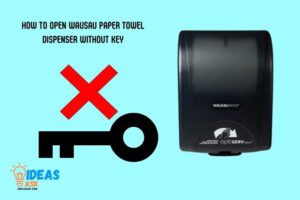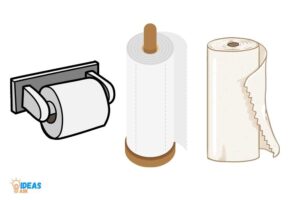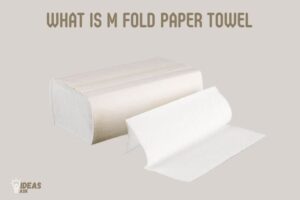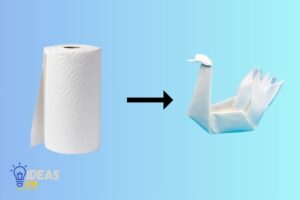How to Stop Using Paper Towels? 7 Eco-friendly Alternatives
To stop using paper towels, replace them with reusable alternatives such as cloth napkins, microfiber towels, or unpaper towels.
Paper towels are a significant contributor to environmental waste and deforestation. By eliminating their use and switching to reusable alternatives, you can reduce your carbon footprint and save money in the long run. Changing your habits and investing in alternatives will help you to stop using paper towels effectively.
One of the best alternatives to paper towels is cloth napkins. They are more absorbent, easy to clean, and can be reused many times.
Cloth napkins also come in various styles and designs, offering a stylish and eco-friendly touch to your dining table. Additionally, using microfiber towels for cleaning tasks can provide better and more efficient results while being gentle on surfaces.
Combine these with unpaper towels and sponges to tackle a variety of cleaning situations and effectively stop using paper towels.
7 Alternative of Paper Towels & Their Benefits
| Alternative to Paper Towels | Description | Benefits |
|---|---|---|
| Cloth Napkins | Reusable fabric napkins meant for personal use during meals. | Washable, reusable, cost-effective, environmentally friendly |
| Dish Towels | Large, absorbent cloth towels meant for drying dishes or hands in the kitchen. | Washable, reusable, cost-effective, environmentally friendly |
| Microfiber Cloths | Soft, highly-absorbent cleaning cloths made of synthetic fibers. | Reusable, effective for cleaning, environmentally friendly |
| Sponges | Soft, absorbent material used for cleaning and wiping surfaces. | Reusable, cost-effective, environmentally friendly |
| Old T-Shirts/Clothing | Using repurposed, worn-out clothing as cleaning rags. | Upcycling, cost-effective, environmentally friendly |
| Bamboo Towels | Reusable towels made from sustainable bamboo fibers. | Biodegradable, reusable, cost-effective, eco-friendly |
| Silicone Mats/Brushes | Non-stick, heat-resistant mats and brushes that can be used in place of paper towels for various tasks. | Easy to clean, reusable, long-lasting, environmentally friendly |
Key Takeaway
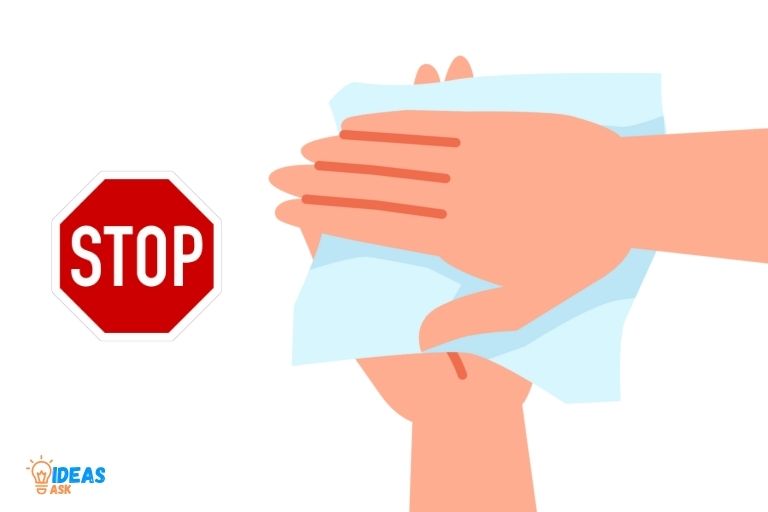
Five Facts About Paper Towels
The Problem With Paper Towels
Paper towels are commonly used in households and businesses for multiple purposes, such as wiping down surfaces or cleaning up spills.
However, their convenience comes with a significant cost to the environment. Here are some reasons why paper towels are harmful and why we need to consider alternatives.
Why Paper Towels Are Bad For The Environment
- The demand for paper towels contributes to deforestation as manufacturers rely on trees to produce them. Once they are disposed, more trees will be cut down to make more.
- Traditional paper towels are not biodegradable as most of them contain plastic resins that take hundreds of years to decompose.
- Paper towel production requires a lot of water, chemicals, and energy contributing to global warming causing impacts such as drought, soil erosion, and pollution.
The Carbon Footprint Created By Paper Towel Manufacturing
The manufacturing of paper towels has a considerable carbon footprint that significantly contributes to climate change. The process of cutting down trees, transportation, and processing them into paper towels is energy-intensive.
Furthermore, the use of non-renewable energy sources such as fossil fuels and electricity derived from coal further exacerbates the problem.
According to a report by environmental paper network, “producing a ton of paper towels generates 3,000 pounds of solid waste and releases 1,686 pounds of greenhouse gases into the atmosphere. ”
The Impact Of Paper Towels In Landfills
Paper towels take a considerable amount of space in landfills. As they are not biodegradable, they cannot breakdown properly, which results in a potential hazard.
In addition, they generate methane gas, a potent greenhouse gas that is 21 times more harmful than carbon dioxide. Methane gas contributes to climate change and worsens the effects of global warming.
Using paper towels negatively impacts the environment, and it’s time we start considering an alternative.
Making changes such as using reusable cotton towels and reducing our dependence on disposable products can make a tremendous difference in reducing our carbon footprint, taking care of the environment, and mitigating the impact of climate change.
Switching To Sustainable Alternatives
Making eco-friendly choices is becoming increasingly important in today’s world. One such choice is ditching paper towels for sustainable alternatives.
High-quality reusable rags and bamboo towels are two such options. Let’s take a look at the benefits of using reusable rags and bamboo towels, as well as how to choose the right ones.
High-Quality Reusable Rags
Using high-quality reusable rags is a great way to stop using paper towels.
Here are some key points to consider:
- Reusable rags are washable and can last for years, making them a cost-effective choice in the long run.
- You can easily make your own reusable rags from old clothes or household linens, reducing waste.
- Use different colored rags for different cleaning tasks to avoid cross-contamination.
Benefits Of Using Reusable Rags
Switching to reusable rags also has many benefits.
Here are some of them:
- Reusable rags are eco-friendly and help reduce waste.
- You can save money by not having to buy paper towels regularly.
- Reusable rags are versatile and can be used for a variety of cleaning tasks, such as wiping spills or cleaning surfaces.
How To Choose The Right Rags
When choosing reusable rags, here are some factors to consider:
- Look for rags made from natural fibers such as cotton, bamboo, or linen.
- Make sure the rags are durable and can withstand repeated washing.
- Choose rags that are the right size and thickness for your cleaning needs.
Bamboo Towels
Another sustainable alternative to paper towels is bamboo towels. Here’s what you need to know about them:
What Are Bamboo Towels?
Bamboo towels are made from bamboo fibers and are a renewable and eco-friendly alternative to paper towels.
Benefits Of Bamboo Towels
Here are some benefits of using bamboo towels:
- Bamboo towels are highly absorbent and can be used for a variety of cleaning tasks.
- Bamboo towels are durable and can be washed and reused many times.
- Bamboo is a sustainable and renewable resource, making bamboo towels eco-friendly.
Remember, making small changes like switching to sustainable alternatives like reusable rags and bamboo towels can have a significant positive impact on the environment.
Maintaining A Paper Towel-Free Lifestyle
Using paper towels is an everyday habit for millions of people. Unfortunately, this practice also contributes to deforestation, environmental pollution, and waste accumulation.
However, transitioning to a paper towel-free lifestyle might seem daunting at first, but with a few essential tips, you can establish a sustainable and cost-effective way of living.
Here are some helpful ways to maintain a paper towel-free lifestyle:
Choosing To Replace Paper Towels With Alternatives In Different Situations
- Kitchen towels: Using washable and reusable kitchen towels instead of paper towels is a great alternative. It is easy to find good quality kitchen towels in the market these days that can last for years, saving money and promoting sustainability.
- Tissues: Replace single-use tissue paper with reusable handkerchiefs or invest in eco-friendly tissue paper made from recycled materials.
- Cleaning rags: Old clothes or towels can be great alternatives for cleaning tasks. Cut them into small pieces and use them for cleaning windows, countertops, and other surfaces.
Maintaining A Stock Of Alternative Supplies At Home
- Stock up on different alternatives such as cloth napkins, washable kitchen towels, and cleaning rags. Having these alternatives readily accessible will make it more convenient for you to stick to your paper towel-free lifestyle.
- Educate family members and roommates about the paper towel-free lifestyle. Encourage them to adopt these alternatives as well.
Tips On How To Make Sustainable Alternatives Easily Accessible
- Place a basket or a drawer in the kitchen designated for cloth napkins, handkerchiefs, and towels. This helps keep them organized, accessible, and top of mind.
- Place a small basket with cleaning rags under the sink in the kitchen or bathroom for easy access while cleaning.
Overcoming Challenges When Trying To Adopt A Paper Towel-Free Lifestyle
- Start by gradually reducing your paper towel usage, rather than completely stopping at once. This will help you adapt to the alternatives and make it more comfortable for you to stick to them.
- Keep in mind that it is okay to slip up occasionally. Don’t give up on your paper towel-free lifestyle completely if you use paper towels again. Instead, reflect on why it happened and work to avoid it in the future.
Transitioning to a paper towel-free lifestyle is an excellent step towards a more sustainable and earth-friendly way of life. With a bit of effort and some alternative supplies, anyone can make this crucial change.
Remember to educate and encourage your family and friends to adopt these healthy habits and make a positive impact on our planet.
FAQ About Stop Using Paper Towels
Are Paper Towels Recyclable?
Most paper towels are not recyclable due to their fiber quality and contamination with food waste.
How Do I Clean Without Paper Towels?
Switch to reusable cloths, rags, or towels. Use a natural cleaner like vinegar or baking soda for cleaning.
How Many Times Can I Reuse A Cloth?
It depends on the type of cloth and what you’re using it for. Wash them after each use for best hygiene.
What Are The Benefits Of Using Reusable Cloths?
Reusable cloths are eco-friendly, cost-effective, and efficient. They also save trees, reduce landfill waste, and lower greenhouse gas emissions.
Conclusion
After reading this article, you now have the knowledge to make a significant impact on the planet by reducing your use of paper towels. Remember, small actions can lead to significant results.
By implementing some of the tips shared here, you can help reduce deforestation, protect wildlife, and decrease greenhouse gas emissions.
Switching to reusable alternatives may seem like a challenging task, at first, but in the long run, it’s a rewarding and straightforward process. We hope that this article helps you take the first step towards a more sustainable lifestyle.
Let’s work together to create a better future for ourselves, our children and generations to come. Thank you for taking the time to read this and your efforts towards a greener planet.


